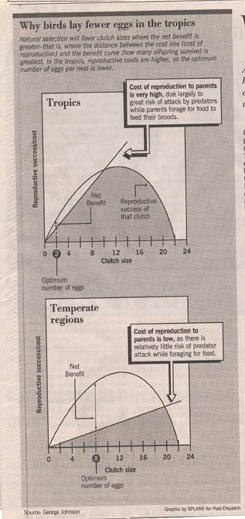An old question may finally have been answered in a way any tired parent can understand
Sometimes odd generalizations in science lead to unexpected places. Take for example an obscure observation published in 1944 by British ornithologist (bird expert) Reginald Moreau: songbirds in the tropics lay fewer eggs than their counterparts at higher latitudes. Tropical songbirds typically lay a clutch of 2 or 3 eggs, on average, while songbirds in temperate and subarctic regions generally lay clutches of 4 to 6 eggs, and some species as many as 10. The trend is general, affecting all groups of songbirds in all regions of the world.
What is a biologist to make of such a generalization? At first glance, we would expect natural selection to maximize evolutionary fitness — that is, songbirds the world over should have evolved to produce as many eggs as possible. Perhaps the birds living in the tropics have not read Darwin, as they are producing only half as many eggs as they are capable of doing.
A way out of this quandary was proposed by a colleague of Moreau’s, David Lack. Lack, one of the twentieth Century’s great biologists, argued that few if any birds ever produce as many eggs as they might under ideal conditions, for the simple reason that conditions in nature are rarely ideal. Its a matter of limited resources. Birds lay fewer eggs in the tropics, Lack claimed, because in the tropics parents can gather fewer resources to feed their young.
Lack points out that in the real world birds can acquire only so much food for their young. Thus, the more offspring, the less parents can feed each nestling. Broods with too many offspring would be undernourished, reducing the probability that the chicks would survive. As a result, Lack said, natural selection will favor a compromise. Birds will tend to lay only as many eggs as there are resources to feed properly.
Lack’s theory is attractive because of its simplicity and common sense — but is it right? Many studies have been conducted to test it. Typically, experimenters have removed eggs from nests. If Lack is right, then the remaining offspring should have a greater chance of making it to adulthood, as they will have access to a larger share of what food the parents can provide. Usually, however, removal of eggs does not seem to make any difference. Parents just adjust down the amount of food they bring to the nest.
One can always argue that tests such as these are not valid, as they involve fiddling with the nests. It is hard to believe that a bird caring for a nest of six eggs would not notice when one turns missing. A clear test of Lack’s theory requires avoiding all such intervention.
Just such a clear test was completed in 1987 in the woods near Oxford, England. Over many years researchers carefully monitored nests of a songbird, the greater tit, very common in the English countryside. They counted the number of eggs laid in each nest (the clutch size) and then watched to see how many of the offspring survived to fly away from the nest. Nothing was done to interfere with the birds. Over 22 years, they patiently examined 4489 nests.
The Oxford researchers found that the average clutch size was 8 eggs, but that nests with the greatest number of surviving offspring had not 8 but 12 eggs in them! Clearly Lack’s theory is wrong. These birds are not producing as many offspring as would be predicted if natural selection were acting to maximize the number of surviving offspring.
Lack’s proposal had seemed perfectly sensible. What was wrong? The evolutionary theorist George Williams has suggested the problem is that Lack’s theory ignores the cost to the parents of reproduction. Reproduction always extracts a price from the parents. Foraging is hard work, and constantly exposes parents to predators. Williams points out that if a bird spends too much time and energy feeding one brood, then it may not survive to raise another. Looking after a large clutch may extract too high a price in terms of future reproductive success.
Only if the cost of reproduction were zero (that is, the parents could gather food effortlessly at no danger) would Lack’s theory be right and nests contain as many eggs as resources permit — but this ideal situation never happens in nature.
Williams argues that natural selection will instead favor clutch sizes where the net benefit is greatest — the more cost, the fewer eggs. In this way the clutch size is adjusted by natural selection for the wear-and-tear on the parents, so that the number of eggs in a nest is almost always smaller than the number which would yield the most offspring — just what the Oxford researchers observed. Nature, in effect, cuts the parents some slack.
©Txtwriter Inc.
